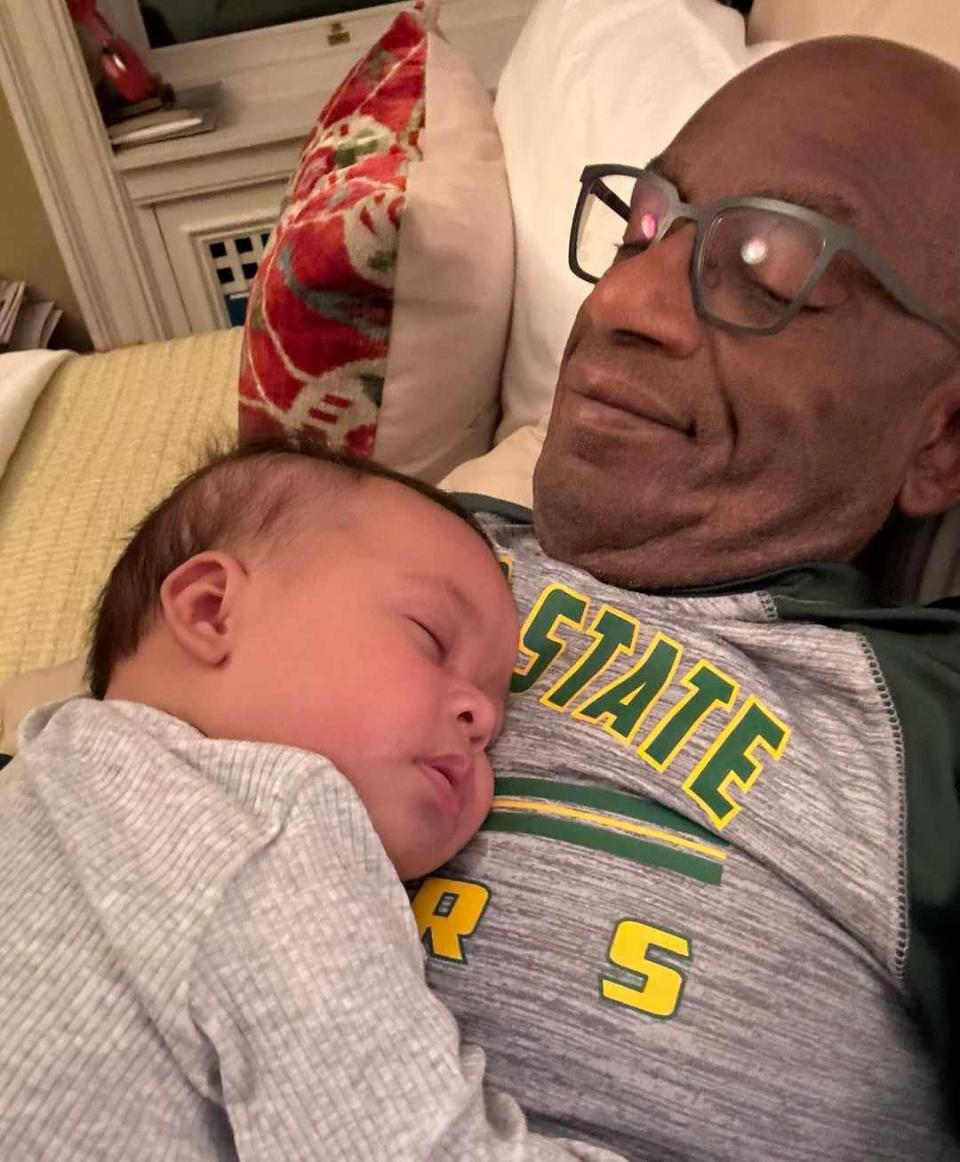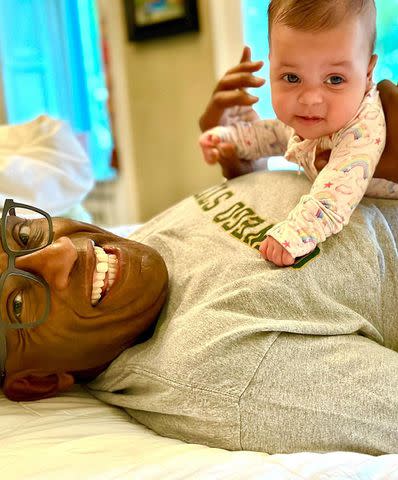Al Roker Says Early Detection of Prostate Cancer Enabled Him to Meet His Grandchild: ‘That Little Girl is Everything’
In an exclusive essay for PEOPLE ahead of Father’s Day, the beloved TODAY show weatherman opens up about how early detection enabled him to meet his granddaughter

Al Roker/Instagram
Al Roker with granddaughter, SkyIn September 2020, amid the COVID pandemic, TODAY show weatherman Al Roker was thinking about postponing his annual physical. But, he decided to make the appointment.
It was one of the best decisions Roker, 69, ever made because it led to his diagnosis of an aggressive form of prostate cancer, which he thankfully caught early.
On November 9, 2020, the popular TODAY co-host underwent surgery at New York City's Memorial Sloan Kettering Cancer Center to remove his prostate, lymph nodes and some surrounding tissue.
Today, his Prostate-Specific Antigen (PSA) levels are below 1, which is considered undetectable.
Roker is sharing his journey in part to remind other men, particularly Black men who are twice as likely to die from prostate cancer, to get checked.
He says he feels blessed that he caught the aggressive cancer early, since he is so close to his wife, ABC News' senior national affairs correspondent Deborah Roberts, their daughter Leila, and son Nick, his daughter Courtney, from his first marriage and her daughter, Sky, who turns one in July.
"I’m so grateful I'm here to be able to see my first grandchild,” he says about Sky. “If there's any reason to make sure you're as healthy as possible, it's that. That little girl is just everything. I mean, I love my children, but my gosh, I didn't know I would love another person this much.”
In an exclusive essay for PEOPLE, Roker talks about being cancer-free and the journey he took to get there.
During COVID, there was a lull, and I thought, "Oh, I need to get a physical." I’d put it off because it just was too difficult. So I went to my GP and he did all the tests.
He said, "Everything's great but your PSA number is up, and that could be any number of things."
He sent me to a urologist who said, "Why don't you come back in two weeks? We'll test it again and see what happens."
I came back in two weeks and he said, "Your PSA is still up. I'd like to do a biopsy." He does the biopsy and says, "We'll make an appointment in two weeks. We'll have the numbers back, it'll be great. Don't even think about it."
Two weeks later, I go back and he says, "I always like to have these conversations in person." He closes the door and I’m thinking, "Wait, what?"
And then he proceeds. To be perfectly honest, I don't really remember exactly what he said. I heard prostate cancer and then I zoned out, which goes to the point that it always helps to have somebody there with you.
Now, in my own defense, I didn’t know I was getting a diagnosis that day. If I had gotten a little heads-up that this might have been the case, I would have probably brought Deborah with me.
As he's talking to me about this, I'm thinking, "Oh, she's going to kill me that she's not here." I knew she obviously would want to be there with me, but I had no idea.

Roy Rochlin/Getty
Al Roker and Deborah RobertsAnd he's going through it and to be perfectly honest, it was all just a blur.
But he did say, "This is something you really shouldn't be waiting on because we think it could be somewhat aggressive."
I went home and after the initial shock, I told Deborah.
She was alarmed. She was obviously worried. She said, "I must look like a terrible wife. I wasn't there for you when you needed me." But how could I tell her? I didn't know.
At that point, she went into full advocacy mode, and she was there for every subsequent appointment, which was good, because you need somebody who is going to advocate for you and take notes and do all that stuff. So I was thrilled that she was there to do it.
We started to do research. And look, one of the great things about working at Today is that we have some really great medical contributors who can recommend some really great folks.
I ended up going with Dr. Vincent Laudone of Memorial Sloan Kettering, who did some more genetic testing and determined that it was a fairly aggressive form of prostate cancer. The PSA numbers had jumped up precipitously in a short period of time.
I could have done laser or radiation or surgery. I said, "Let me just get rid of this. Just take it out."
A month later I had the surgery.
On the Road to Healing
In a sense, all of this jump-started making sure I'm as healthy as possible. After they send you home, they say, "This first week, the best thing for you is walking. I would like for you, by the end of the week, to be walking if you can, five miles a day."
And so I was.
I didn't question it that much. I'm very much a rule follower. It reminded me of the old Rodney Dangerfield joke, "Hey, I went to my doctor and he said, ‘I want you to walk five miles a day. Call me at the end of the week’. So at the end of the week, I called him up. He said, 'where are you?' I said, I'm 35 miles from home."
Everything I learned in life, I learned from Rodney Dangerfield.
So I just started walking and it was great. It was like a mental health thing, and I felt better. I felt like I was in some control.
And look, the first week you're wearing a catheter and you got a bag on your leg. But it was great because usually when you're walking, if you have to go to the bathroom, you’ve got to find a public bathroom. With this, you're able to walk.
The First Post-Surgery Check-Up
After the surgery, you've got to come back in six months to see where you are. And so as that six month date comes up, you're a little more anxious because did this take? Is everything okay? I mean, they biopsy the material they take out and feel they got all of it, but you don't know.
I go and Dr. Laudone said, "Okay, you're under 0.01, which is undetectable." That's their standard.
Since then, it's been fine. I get blood work done every year.
Raising Awareness to Help Others
All of this obviously saved my life. If people who are in the public eye choose to stay private about (their prostate health), that's their choice. No judgment. But if you're going to go through this and if you can help others, why not do that?
Black men are more likely to develop prostate cancer, especially more virulent strains of it, and they are twice as likely to die from it.
So to me, it's important to do something to publicize that, and that's why we did it. And Dr. Laudone said right after we did that story, they saw probably a 40% jump in all males scheduling prostate exams.
Surviving Another Major Health Crisis
Seeing that felt good. But listen, it was no secret that two years later, I had another massive health issue. [He was hospitalized in 2023 for blood clots in his legs that spread to his lungs and then again for internal bleeding from bleeding ulcers. Doctors performed a complicated surgery to resection his colon, remove his gallbladder and repair his duodenum, part of the small intestine, Roker told PEOPLE previously.]
My doctor told me, my surgeon told me that if I was not in the shape I was in, I most likely would have died.
I was close to dying anyway, but because I was in pretty good shape, that was probably the difference literally between life and death.
So in a way, the prostate diagnosis saved my life twice.
You can look at it like, "Oh, woe is me," or you can look at it, "Wow, thank goodness."
Screenings Are Key
I had no symptoms. And that's the thing about prostate cancer is that, yeah, there are symptoms, but by the time you're feeling symptoms, that means it's progressed, generally speaking.
So the prevention is really important. Listen, is it a little momentarily uncomfortable for that exam? Yeah. But really at the end of the day, it's no big deal.
Prostate cancer develops in the prostate gland and forms slowly, according to the Mayo Clinic. It typically has no symptoms at the beginning, though in advanced cases men can have trouble urinating, experience pain in their hips and back, have erectile dysfunction and find blood in their urine or semen.
The American Cancer Society recommends screenings starting at age 45 for Black men and males who have had a father or brother diagnosed with prostate cancer before 65.
But, according to the Prostate Cancer Foundation, Black men should start testing for prostate cancer even earlier at age 40. That's because Black men are 1.7 times more likely to be diagnosed with — and 2.1 times more likely to die from — prostate cancer than white men, according to ZEROCancer.org.
All men ages 55-69 should talk to their doctors about getting screened, according to the U.S. Preventive Services Task Force.
Everyone Needs Good Health Care
I'm very fortunate in that I have somebody like Deborah who is an advocate. And I'm very fortunate because a lot of people in this country don't have great healthcare.
They don't have the ability to go to the doctor or if they have healthcare, they have to make an appointment months out. You hear these horror stories where people have to wait two, three months to get the treatment and that's crazy.
If I had waited two or three months, you would be doing this interview with Deborah talking about prostate cancer prevention.
So I know that I'm really fortunate I have access to the kind of care that saved my life. But I also realize that there are a lot of people who don't, and I think that has to be our focus.
Good Health Means More Time with Loved Ones
I love spending time with my granddaughter. She's well-loved. She's a very content baby. And by the way, has a very good palate. I was just with her this past weekend, and I was feeding her, she's going to be a year in July, feeding her, I had a salad and she was eating some anchovies and olives and some grapefruit.

Al Roker/Instagram
Al Roker and granddaughter SkyShe likes savory very much.
That's not surprising because her mom is a chef.
For more People news, make sure to sign up for our newsletter!
Read the original article on People.


